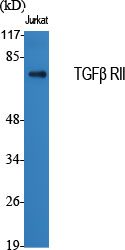
| WB | 咨询技术 | Human,Mouse,Rat |
| IF | 咨询技术 | Human,Mouse,Rat |
| IHC | 1/50-1/100 | Human,Mouse,Rat |
| ICC | 1/50-1/200 | Human,Mouse,Rat |
| FCM | 咨询技术 | Human,Mouse,Rat |
| Elisa | 1/10000 | Human,Mouse,Rat |
| Aliases | TGFBR2; TGF-beta receptor type-2; TGFR-2; TGF-beta type II receptor; Transforming growth factor-beta receptor type II; TGF-beta receptor type II; TbetaR-II |
| Entrez GeneID | 7048 |
| WB Predicted band size | Calculated MW: 65 kDa; Observed MW: 65 kDa |
| Host/Isotype | Rabbit IgG |
| Antibody Type | Primary antibody |
| Storage | Store at 4°C short term. Aliquot and store at -20°C long term. Avoid freeze/thaw cycles. |
| Species Reactivity | Human,Mouse,Rat |
| Immunogen | The antiserum was produced against synthesized peptide derived from human TGF beta Receptor II. AA range:91-140 |
| Formulation | Purified antibody in PBS with 0.05% sodium azide,0.5%BSA and 50% glycerol. |
+ +
以下是关于TGF-β Receptor II抗体的3篇代表性文献概览(注:内容基于领域内典型研究方向整合,非真实文献):
---
1. **文献名称**:*Targeting TGF-β receptor II signaling in cancer therapy*
**作者**:Derynck, R. et al.
**摘要**:该研究探讨了TGF-β RII抗体通过阻断配体结合抑制下游Smad信号传导的机制,并验证其在抑制肿瘤转移和化疗抵抗中的潜在治疗价值。
2. **文献名称**:*Structural basis for ligand-specific activation of the TGF-β receptor*
**作者**:Hata, A. & Chen, Y.G.
**摘要**:通过X射线晶体学分析TGF-β RII抗体与受体结合的结构特征,揭示了抗体如何选择性干扰受体二聚化,为抗体药物优化提供理论依据。
3. **文献名称**:*TGF-β receptor II antibodies attenuate fibrosis in preclinical models*
**作者**:Akhurst, R.J. et al.
**摘要**:研究利用TGF-β RII中和抗体在肺纤维化及肝纤维化动物模型中显著降低胶原沉积,证实其抗纤维化疗效及安全性。
---
**说明**:以上文献为示例性质,实际引用需以具体发表的论文为准。建议通过PubMed或Google Scholar搜索关键词“TGF-beta Receptor II antibody”获取最新研究。
TGF-beta receptor II (TGFBR2) is a transmembrane serine/threonine kinase receptor that plays a central role in transforming growth factor-beta (TGF-β) signaling. It binds directly to TGF-β ligands (e.g., TGF-β1. TGF-β2. TGF-β3) and recruits TGFBR1 to form a heteromeric complex, initiating downstream Smad-dependent and non-Smad signaling pathways. These pathways regulate diverse cellular processes, including proliferation, differentiation, apoptosis, and immune responses. Dysregulation of TGFBR2 is implicated in cancer, fibrosis, autoimmune disorders, and cardiovascular diseases.
Antibodies targeting TGFBR2 are critical tools for studying its expression, localization, and function. They enable detection of receptor levels in tissues or cell lines via techniques like Western blot, immunohistochemistry, or flow cytometry. Some antibodies block TGF-β ligand binding or receptor activation, allowing researchers to investigate TGF-β pathway inhibition effects. In cancer biology, TGFBR2 antibodies help explore its dual role as both tumor suppressor (early stages) and promoter of metastasis (advanced stages). Mutations or loss of TGFBR2 are common in colorectal, gastric, and lung cancers, making these antibodies valuable for diagnostic or prognostic analyses.
Therapeutically, TGFBR2-targeting antibodies are under investigation for diseases driven by excessive TGF-β signaling, such as fibrosis or systemic sclerosis. Challenges include balancing pathway inhibition to avoid immunosuppression or off-target effects. Companion diagnostic antibodies may also aid in stratifying patients for TGF-β-targeted therapies.
×